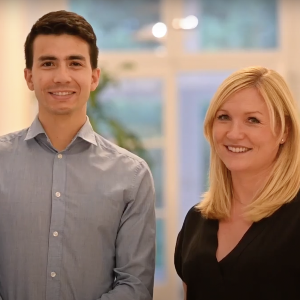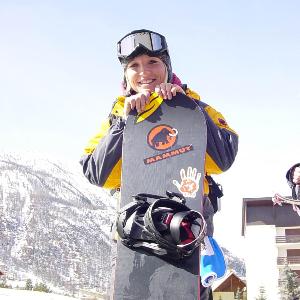„Everybody needs a mentor“
13 Jan 2021
The LMU Mentoring program: Benefit from the experience of an older person and thus find a good job. But what does that look like in practice?
13 Jan 2021
The LMU Mentoring program: Benefit from the experience of an older person and thus find a good job. But what does that look like in practice?
Sebastian Londoño Arango and Dr. Annette Klett-Steinbauer are a team. He is in his final semester of business administration at Ludwig-Maximilians-Universität in Munich, while she is the founder and company director of a management consultancy in Munich. They were brought together by LMU’s Mentoring Program. For more than a year, Klett-Steinbauer has guided her mentee with advice and support. Their goal: the best possible start to his career.

Sebastian Londoño Arango is Dr. Annette Klett-Steinbauers mentee.
"I certainly wouldn't describe myself as a mentor in the classic sense," Dr. Annette Klett-Steinbauer says, laughing. "You would probably expect someone with the right kind of experience, who had planned their career after graduating — that definitely doesn't apply to me."
Klett-Steinbauer, now the director of a small management consultancy, does not have a traditional resume. In her mid-twenties, she studied business administration at LMU Munich, yet her true passions were the mountains and snowboarding. At the time, she had already been an active member of the German national snowboarding team for several years and was about to make it onto the Olympic squad.
More often than not, she would study for her university exams while flying. She obtained her degree, followed by her doctorate, almost as an aside. Her sport left her no time for internships. Establish her own professional network? No chance. However, this experience made Klett-Steinbauer who she is today, demonstrating that a compelling resume is not always a requirement for a career. As a mentor, the LMU alumna now wants to pass on this insight to others.
Sebastian Londoño Arango was in his final semester of business administration at LMU in summer 2019. The closer he came to looking for his first job, the more questions he had. "I felt disoriented. I had no idea what direction to take." He had been in Germany for eight years; his home in Colombia, his family and friends were a world away. "It would perhaps have been different if I had been at home. But I was alone here. I needed somebody to extend my network."
He signed up for LMU’s Mentoring Program. The main aim of the program is to establish a link between early-career academics and managers, thereby helping them acclimatize to the world of work after university and offering guidance in the process. Four mentors were shortlisted, all matching Londoño Arango's profile. He chose Klett-Steinbauer and has been her mentee ever since.
The principle of mentoring is simple. Young academics benefit from the experience and contacts of older advisers. In practical terms, this generally means a manager coaches a student for one or two years, usually during the crucial transition between graduating and starting their first job.
The personal development of the mentee is paramount, with trust, reliability, and discretion playing a central role. The mentee can ask whatever questions are uppermost in their mind. Honest criticism is also part of the joint process. The mentor's role is to encourage and challenge the student.
Nevertheless, the structured, inter-generational exchange of ideas calls for a clear framework. The mentor and mentee start the process of rapprochement with a heart-to-heart, agreeing on when, how often, and under what conditions they are to meet.
Londoño Arango and Klett-Steinbauer had lunch together and got on like a house on fire. According to Klett-Steinbauer, this is a key factor. "I can only offer proper guidance if I feel that my mentee is authentic, that they will openly address issues and express uncertainties frankly."
The tandem themselves decide how much time they both want to invest in the partnership. "It's fairly common for a longstanding friendship to develop between the mentor and the mentee," says Dr. Stephan Pflaum, supervisor of LMU’s Mentoring Program since 2012. From his experience of placing over 2,000 students in tandems with specialists and managers, he knows too well that the encouragement makes an enormous difference to their careers. He has since accumulated a pool of over 800 mentors.
LMU’s Mentoring Program was founded in 2001. At the time, Germany's labor market figures were a cause for concern. "Students from non-business faculties, such as the humanities and social sciences, had to face the fact that they were unlikely to find a job after graduating," Pflaum says. The support program was launched to help make the transition from university to working life as smooth as possible. It proved to be a resounding success. Over the years, there has been an increasing awareness of the importance of mentoring — in all subjects.
Therefore, the Mentoring Program is open to students of every faculty at LMU Munich. They can make an appointment for a consultation with Dr. Stephan Pflaum directly via an app.
He believes that "Everybody needs a mentor, a sparring partner with whom they can discuss personal and professional questions." After all, a mentor offers students an objective opinion. Unlike family or friends, the advice they give is completely impartial. "Feedback from those close to us tends to be overly positive," Pflaum points out. On the other hand, honesty is fundamental to mentoring, along with trust.
When a position became available in her company, Klett-Steinbauer offered her mentee an internship. It was a lucky break. Londoño Arango shadowed his mentor in her day-to-day work, observing her at the company, and learning from her on the job. After his internship, he stayed on as a student worker. Their relationship goes beyond a purely goal-oriented, professional connection.
It was not long before he met Klett-Steinbauer's two children; the personal contact made it easier for him to ask questions that would not be appropriate in a corporate environment. "I was able to ask her things that I couldn't have asked anybody else," Londoño Arango says.
How should I act toward managers? What's the best way of handling critical topics or tension between colleagues? What conditions are important to me when starting my career?
Apart from the valuable advice, his work experience in Klett-Steinbauer's company was helpful in deciding in which direction to head after leaving university. Londoño Arango enjoyed working in the friendly atmosphere at the relatively small management consultancy.

Sometimes the right path just falls into your lap, as Klett-Steinbauer can confirm. "I was no exception, stumbling into my first job at a consulting agency. I never really wanted to be a consultant but suddenly realized that I loved doing it." Klett-Steinbauer then spent several years in management and strategy consultancies before teaming up with colleagues to found her own company.
Her unconventional background never held her back; on the contrary, she relies on her sporting network to this day, even in consulting issues. "In many cases, students have no idea what people in business are really looking for," Klett-Steinbauer says. "I want my mentees to understand that there are no hard-and-fast rules when it comes to careers. I want to encourage them to try out lots of things, to break out of their bubble, and broaden their horizons."
Apart from the personal counseling, the support program includes different events. Workshops on topics such as soft skills or coaching are aimed specifically at mentees and mentors, with both parties benefiting.
"Mentoring is never a one-way street," agrees Klett-Steinbauer. The partnership can prove to be a win-win situation. That includes Klett-Steinbauer's consultancy. "We also use the LMU program as a recruiting platform. We place great emphasis on maintaining close ties with young academics to find promising future candidates," she says.
The concept has yet another advantage. When today's mentees realize just how much they benefit from the contact with experienced managers, they in turn will help shape a culture that embraces this interconnectedness as a given, much more than today, which will have a positive impact in the long term.
There is never a dull moment for the Klett-Steinbauer/Londoño Arango duo: Londoño Arango started his first full-time job at a management consultancy three weeks ago. He no longer needs to ask "What's the next step after university?"
This marks a new chapter in his career — and his mentor is still guiding him every step of the way. For they have decided to continue their relationship even after he has his degree.